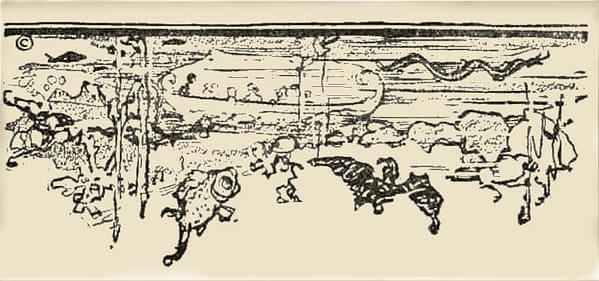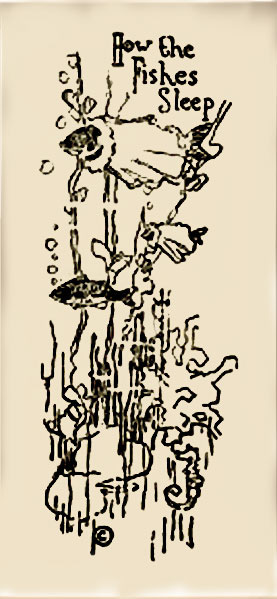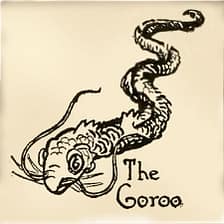“Now we will drop down from the sky a way,” said the little dark man, “and I hope soon to show you some other interesting things. But, madam, you must be ready to throw the green powder into the engine the moment I tell you to do so.”
Even as he spoke, the boat began to descend, and now struck the water with a soft splash. “Quick! the green powder now!” cried the little dark man. At that instant, the Widow Pickle tossed a pinch of the green powder into the furnace door, and, to her great surprise, the little ship settled down gently, the steam changed from blue to green in color, and the wheels began to turn around with a motion which sent the boat forward very quickly.
“Mamma, mamma,” cried Zuzu, “we are sinking! Look! We are going down!”
Lulu also was very much excited, but the Private Secretary smilingly reassured them.
“Of course,” he said. “Did you suppose the Gee-Whiz Express would run upon the top of the water like any ordinary steamboat? Any one can build a boat like that.”
“But we’ll all be drowned,” cried the Widow Pickle.
“Not in the least,” said the Private Secretary. “We are five hundred feet beneath the surface of the sea at this present moment, and if we were going to be drowned we should have begun to feel strange long ago. Evidently, madam, you forgot the glass which covers us over. We can see through it distinctly, but it won’t let any water in. I am sure we shall enjoy our voyage very much. Moreover, we have with us the Enchanted Banjo, and it will play for us whenever the Royal Heirs are so good as to assist it.”
The Banjo seemed to be in a jolly mood as well as the Royal Heirs, for as soon as the Twins grasped it together it rattled off at once into the following jingle:
SONG OF THE ENCHANTED BANJO
Once I was but a banjo of the ordinary sort Until a minstrel played me for the pleasure of the court, And quite by accident he struck the sweet and simple tune The Fairies love the dearest when they dance beneath the moon. Oh, it was most amazing, when to every one's surprise The Queen of all the Fairies came to view before their eyes! They gazed upon the Fairy Queen, and she smiled back at them She wore a robe of woven gold, with silver on the hem, Her wings were set with diamonds and made of golden gauze, And she was quite the finest Fairy Queen that ever was. She stopped before the royal court and held her place alone, Then bowed and gracefully sat down before the Royal Throne. The Fairy Queen then waved her wand; the minstrel stepped away, And I, suspended in the air, at once began to play; I played them all the Fairy tunes that ever have been made, And everybody knew the words to everything I played. I played before the Fairy Queen, and did my best, you see— And therefore I enchanted her, then she enchanted me.
“Now let’s play we are pirates!” cried Zuzu.
“Very well,” said the Private Secretary. “The Banjo knows that a great many people feel like playing pirate, so perhaps it will sing of one or two.” The Banjo then played for them the following melody:
THE PIRATICAL JUNE-BUG
A June-bug once went out to sea—
Yo-ho, my lads, yo-ho!—
With sails aspread and helm alee—
Yo-ho, my lads, yo-ho!
He had a long, low, rakish boat;
He wore a shining overcoat;
He hummed and grumbled in his throat—
Yo-ho! the wild winds blow!
This bold June-bug he said, said he:—
"Yo-ho, my lads, yo-ho!
A pirate's life is the life for me!
Yo-ho, my lads, yo-ho!"
He roamed about the ocean blue
And bossed his rumbling, stumbling crew,
And sought for wicked things to do.
Yo-ho, the wild winds blow!
Now when a June-bug heaves in sight—
Yo-ho, my lads, yo-ho!
You'll notice it is full of fight—
Yo-ho, my lads, yo-ho!
When it sails by, with curve and dip,
And strikes the wall with bang and "bip!"
It's dreaming of its pirate ship—
Yo-ho, the wild winds blow!
Yo-ho!
Yo-ho, my lads, yo-ho!
The submarine boat went ahead very rapidly all this time, dropping down until at length it struck the bottom at a depth of several thousand feet. Fortunately, it landed at a place where there was smooth, white sand so that no damage was done; and it at once began to run along the bottom of the sea.
“I would rather go on through the water the way we were,” said Lulu, “and not on the bottom, for I find it much more bumpy in this way.”
“True,” said the Private Secretary, “but by journeying upon the bottom we are not so apt to get lost as though we tried to go directly through the water. If you will observe, we are now following the main traveled road to the Island of Gee-Whiz, and if all goes well we shall hardly lose our way. I need not explain to you that to be lost in the middle of the ocean, two or three thousand feet below the surface, is one of the worst things that can happen to a person. But don’t think we are going slowly, because we are making at least a hundred miles an hour, as you may tell by looking at the scenery we pass.”
“And very beautiful the scenery is,” said the Widow Pickle. “Look, my children, at the trees and the hills; and yonder is a high mountain all of coral, if I am not mistaken.”
“Quite right,” said the Private Secretary. “This is one of the best places in the world for coral beads, and if we had time we could get all we wished.”
“Look, look, mamma!” cried Lulu, “isn’t that a whale?”
The Widow Pickle stopped to put on her glasses, and the Private Secretary answered for her. “Yes,” said he, “that is a whale, and a very good one. See, it means to swim us a race.”
The great whale was now swimming alongside, its vast jaws working convulsively, and its tail in such rapid motion that long white sparks flew from its extremity.
“Poor fellow,” said the Private Secretary, “he thinks, as you do, that we are not going very fast. See him perspire! I can tell him now that he might as well drop behind, for the Gee-Whiz Submarine Express is much the fastest thing that swims the deep.”
“But what is that out there, mamma?” cried Zuzu, whose nose was pressed flat against the glass.
“That,” said the Widow Pickle, “is something so strange that I have not the slightest idea what it may be.”
“It is a Flying Nautilus,” explained the Private Secretary, “a very beautiful creature, which has wings like sails, but it can not sail with us; and yonder, I see, is a Goroo; but even the Goroo will find that we go too fast for it.”
The Goroo now swam alongside for some time. It was a long, slender monster, with a body something like that of a snake and a long, tapering head, from which two horns arose and fell back gracefully over its shoulders. Its eyes were very large and prominent, and it had four or five fierce whiskers on each side of its mouth, all of which were bright pink in color. It had twelve fins along its back, which enabled it to swim very rapidly indeed.
“The Goroo,” said the Private Secretary, “is often by mortals called a sea-serpent, and this fact causes us who live in Gee-Whiz considerable amusement, because we know that it is not a sea-serpent, but a Goroo. It would eat a man if it had a chance, but it can not harm us so long as we are in the boat.
“See,” he continued, “that short fat-looking animal we have just passed is a Calabite, a very rare and odd fish, which lives entirely upon fresh oysters. It cracks the oyster shells with its long teeth, just as you do hazelnuts, and it eats so many that often fishermen wonder where all their oysters have gone. If the truth were known, it would very probably be found a Calabite had eaten them.
“That large creature with a long mane and six legs on each side,” he resumed, “is a Talapud, a creature never seen in any menagerie, so far as I know. It can travel very fast indeed, but though it has six legs on each side, it is very lazy, so that it rarely exerts its full speed. We shall, no doubt, pass it easily.
“There, also, is a Naugalook, that bird-like thing, which also swims with wings instead of fins. As you see, it has a very wide and cruel beak, and many a fish it eats each year. It is the eagle of the sea, and very dangerous to meet unarmed, on account of its great size and ferocity.
“The Waugog, as you may observe, is a sort of turtle. There are two just coming out of their holes; stupid things, who think of nothing but eating, and can travel scarcely faster than a turtle upon the land. A full-grown Waugog is as large as a church, and should we run against one at full speed, it would jar the boat very much. You will see, madam, that travel underneath the sea is not without interest.”
“I should say not,” said the Widow Pickle; “quite the opposite, indeed, and I am very glad to have my children thus improve their education.”
“There is one thing I should like to ask,” said Zuzu, “and I have often wondered about it.”
“And what is that?” asked the Private Secretary.
“I wonder how the fishes ever go to sleep.”
“That,” replied the Private Secretary, “is something over which many wise men have also wondered. I have often heard the Banjo on our sea journeys express the same curiosity. Perhaps it will tell us about that.”
At his suggestion the Banjo sang a little song.
HOW THE LITTLE FISHES SLEEP
I often wonder how and where
The little fishes sleep;
They do not need to braid their hair
Before they slumber deep,
But possibly each little fish
Puts on a little gown
And goes to bed—and Oh, I wish
I knew where it lies down.
I wonder if it tumbles round
And kicks the covers off
And wakes at every little sound,
Or—does it have a cough?
I think it would, for mamma says,
When she turns down my lamp
I'll get the croup one of these days
From staying in the damp.
But maybe little fishes go
To sleep as you or I;
Waves rock the cradle to and fro
And sing a bye-lo-bye.
If they wear gowns, though—goodness me!
When washing-day is here
Where do they dry things in the sea?
I wish you'd make that clear!
“Humph! The Banjo doesn’t seem to know any more about it than we do,” said Zuzu, not fully satisfied.
“No,” the Private Secretary replied; “that is true; but for some of these hard questions we may have to go to the Fairies for answer, and it is some distance yet before we get anywhere near the Fairy country.”
“How far have we gone now, sir?” asked Zuzu.
“That,” replied the Private Secretary, “is difficult to explain, for you must see that we do not measure distances as you do. However, I should think it would take us perhaps three or four more of what you call your hours before we are within sight of the Island of Gee-Whiz. We must first pass the Agalone Mountains. Indeed, it seems to me that I see that mountain range now beginning to appear before us.”


